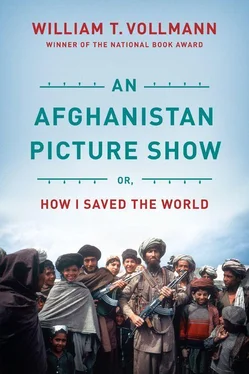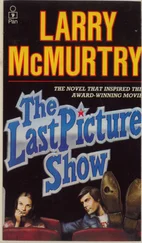On his trip back to the base from the raid, the Young Man traveled with four friends who had given up their jihad for his sake. (In every respect, it seemed, he was a burden.) The way was very steep for the last two hours; it was der möskel , very difficult. When he began to fall behind, he told them to go on; presently he was all alone, and walking among unfamiliar hills. He thought: Oh, God, I’m lost in Afghanistan, and with no water. But he kept on walking; and after a while he recognized a landmark, a view he’d stared at through his telephoto for days as he looked toward the tanks, so he kept going until the angle of vision was right, and he saw the beginning of the forested mountains and knew that he had made it. —China, china , he kept saying to himself, licking his lips: —Spring, spring.
Suddenly he saw two of his companions a hundred feet below him. It was almost sunset. —“Asalamu alaykum,” he said. They had been wandering all over the hills looking for him. — “Ouilliam, Ouilliam,” they sighed tolerantly. — He expressed his apologies. — One of his friends helped him down the last hill with his strong hand. The Young Man was in an agony of thirst. He kissed the Mujahid’s hand with his bloody lips. At the china he drank a quart of obuh , then settled back for serious and attentive consumption. As he walked the last hundred yards to the spring, he had kept thinking: I’m so happy, I’m so happy, I’m so happy.
Now on the train he was not as thirsty as that, but still he was thirsty, and it was hard to think of anything else in the world. They stopped at a little station, and a banana seller came by. The Young Man hissed, the way the Pakistanis did.
“Hello,” the banana seller said in English.
Bananas were safe; you could peel them. And they would be moist inside. There was a great cracking lump in his throat.
“Bananas,” he croaked, not knowing the Punjabi word.
The vendor went back to his cart and pushed it away, walking down the tracks to the next car. The Young Man hissed and hissed, without any luck. Finally the train began to move slowly away from the station, and he passed the man again. He held out a five-rupee note pathetically. The banana seller stared at him, said something, and thrust a giant bunch of bananas into his hand — it must have been forty or so. The train went on. Evidently most people used a one-rupee note for that transaction.
A few of his compartment mates had woken up, and they laughed at him and his many bananas good-humoredly. “Okay,” they said to him delightedly. “Okay.”
The bananas were juicy and sweet. He ate about twenty of them right away to satisfy his thirst, and gave most of the remainder away over the hours.
One man had a flute. He played sitting on a seat top. The flute was gorgeously carved and painted with rings of color.
“You like?” the flute player said when he found that the Young Man could speak a little Pushtu.
“Very much. Very good. How long you play?”
“Ten years. For you. Gift. Take to Am-rika.”
“But I cannot use. No understand flute.”
They tried to show him how to play. For half an hour they tried. He couldn’t blow a note. They laughed and laughed; it was a game. He laughed, too. After a while another man tried to learn. He couldn’t do it, either. They all laughed.
They bought him sodas all day, and dinner ( dordai with onion, a few tomato slices and, for the main dish, lumps of corn flour fried in curry oil). When he thanked them, they looked a little hurt, and said, “But it’s our duty!”
On hospitality:
1. If you extend it to everyone, does it mean less because you don’t care about the particular person involved, or more because you genuinely care about everyone?
2. If you exclude Russians, Kaffirs, et cetera, does that make hospitality mean more or less? (Sartre says two people make a community by excluding a third.)
You cannot love as thoroughly as you ought to, and you cannot love those who aim to destroy you, but you can love (maybe, the Young Man qualified, gulping). Click to next picture: His first night at the Hotel Excelsior, which they called the Hotel Exercise; across the street there were people sleeping at the State Hotel on tables outside; and what I find most astonishing about that is that he was astonished, because at that time there weren’t so many people in his country who had to sleep that way; if I went to Pakistan now and saw them I probably wouldn’t even notice.
On the Afghans:
They have their faults, but so do we. Let us give them what we can. And let’s accept whatever they can give us.
That’s really what he wrote and thought; it seems so sweet to me now, like something that a child might have written. He had the feeling of being rich, his notebook and cassettes now filled weightlessly with information susceptible to understanding. He would comb it like a head of hair, having whipped out his long- and fine-toothed analyses. Now that the Soviets have left (whether or not they come back), it is funny to see how much of it has turned to ashes.
On the Pakistanis:
The same.
It was an overcast day when the Young Man disembarked at Karachi Cantt. Everyone invited him to stay. He went instead to a youth hostel, drinking Sprite after Sprite until his Pakistani money was gone. Then he lay listening to the call to evening prayers.
…“ wie fromme viktorianische Kriegsgeschrei …” said the Süddeutscher Zeitung as they flew out of German airspace, the Young Man rolling back home like the proverbial foul ball to the fallow field. — “Sorry about the turbulence,” the captain said. — The Young Man didn’t mind it. It kept him awake. But his eyes flicked down to his belly, where he felt the familiar cramps begin — was it that grape-leaf stuff from the Turkish caterer, or simple intestinal incredulity at preservatives, meat ’n’ cheese? A glut of food for whatever reason on airplanes, and never enough to drink — half the volume in the glass is ice cubes, and after ten 7-Ups a day in Pakistan he needed it, oh how he needed it — even the air-conditioning seemed fake, and his body could not stop preparing itself for the shock that must come when it ended, as when he stepped out of Levi’s car, or the Habib Bank, or the American Center, into the reality of dear old P-P-Peshawar — and every time a hair moved on his head he raised his hand, expecting to dislodge a cloud of flies, for the moment too ill and exhausted to plan out the action-steps of his Help to the Afghans stage by stage; †closing his eyes, he did not see the narrow cafe in Peshawar with its counter topped with long-necked bottles of Mango Squash and rose-flavored syrup, the racks of Sprites and Fantas in the cooler with its magnificently transparent double doors (although it was not cool inside), where the customers sat, dark-mustached, with wide giving eyes, and someone always bought the Young Man a soda when he came in; and it took him years to think the thought: What if I had bought everybody there a soda? — since after all that’s all I could have done for them — but he had selfishly hoarded in order to be selfless, as for instance in Afghanistan when the Mujahideen were sitting under a tree with him and they wanted to play an Indian rock-and-roll cassette on his tape player but he said no because he had to save the batteries for interviews; after all, interviewing them was the only way to begin helping them (to his credit, he did at least feel bad about it — he honestly was not stingy even though he acted that way; he was convinced of himself just as Pakistanis and Afghans were each convinced that the other was dirtier); and the plane descended toward this — ISLE, this — WHIMSY, this — POMP AND CIRCUMSTANCE where all topics are mediated through sports and weather and people read books like All Quiet in the Garden and (look at the lovely unveiled face of that girl across the aisle!) now here they all were in this — ENGLAND … He had lost thirty pounds. He had taken about twelve hundred slides, most of which were worthless. Soon he would be organizing his Afghan relief presentations, to which hardly anyone would come; he would scrupulously send his pure-got contributions to Pakistan, in doses so small that they ought to have been homeopathic, instead of simply useless. — Oh, he was determined to be of use, all right. Two years after his return, he began learning to shoot a gun…
Читать дальше












